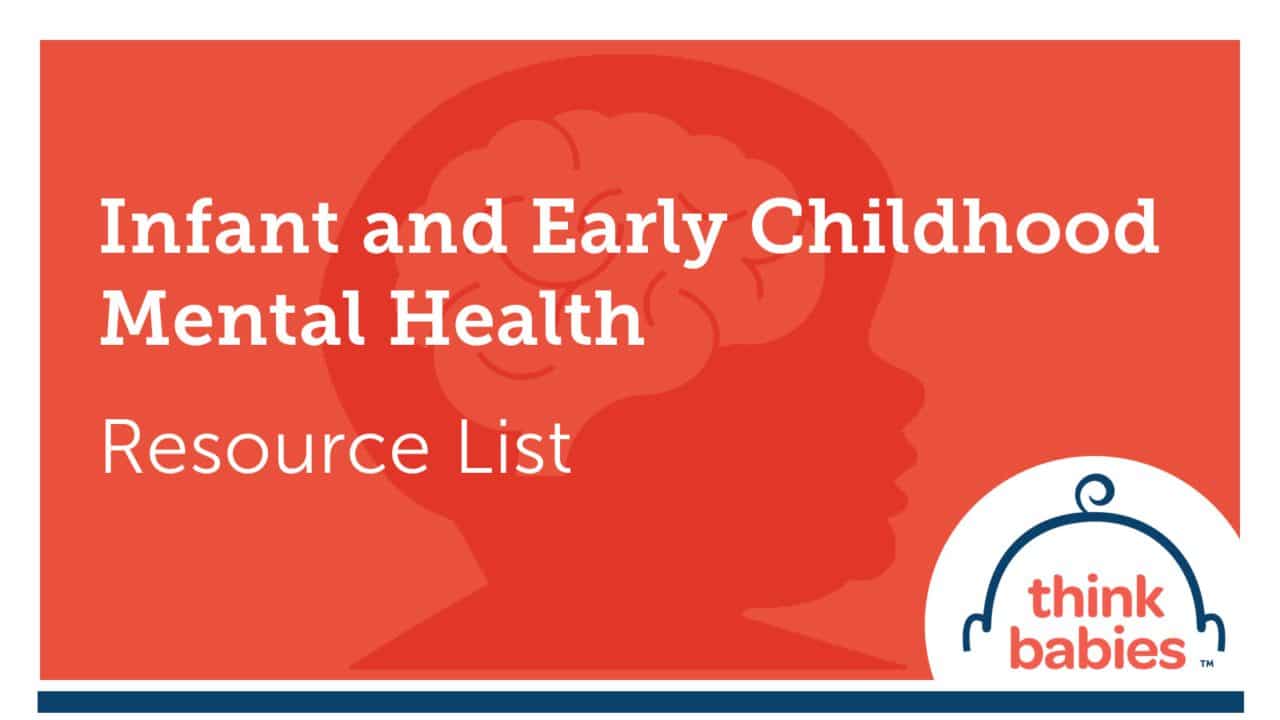Infants and toddlers need access to a full continuum of infant and early childhood mental health services. This annotated resource list includes a range of materials, such as policy briefs, fact sheets, websites and tools, to help stakeholders learn about the issue.
ZERO TO THREE Resources
Exploring State Strategies for Financing Infant and Early Childhood Mental Health Assessment, Diagnosis, and Treatment, ZERO TO THREE, January 2019 – This paper summarizes key themes from a cross‐state IECMH convening held in May 2018; describes approaches to improving state policy supporting IECMH assessment, diagnosis, and treatment; and concludes with ten tips for advancing state IECMH policy. State examples are provided throughout to illustrate core areas that can be employed to improve IECMH, such as: growing, training, and supporting the workforce; securing and sustaining financing for services; building systems that support integration; and cultivating leadership inside and outside of government.
Advancing Infant and Early Childhood Mental Health: The Integration of DC:0‐5™ Into State Policy and Systems, ZERO TO THREE, July 2018 – This paper explores how states are integrating an age‐appropriate diagnostic classification, DC:0‐5™: Diagnostic Classification of Mental Health and Developmental Disorders of Infancy and Early Childhood (DC:0‐5) into state policy and systems. The DC:0‐5 enables clinicians to accurately diagnose IECMH disorders and connect very young children to treatment services. Adopting DC:0‐5 into practice can be an effective strategy for increasing access to IECMH services and improving outcomes for children.
How to Talk About Infant and Early Childhood Mental Health Infographic, ZERO TO THREE, March 2019 – This infographic provides the definition of IECMH and illustrates how all service areas touching the life of a child play a role in supporting social and emotional development.
Infant and Early Childhood Mental Health Policy Series, ZERO TO THREE, 2017 – This series of short briefing papers on infant and early childhood mental health (IE policy are designed to generate awareness, interest, and action among federal and state policymakers, behavioral health administrators, and advocates. Each paper provides an overview of the topic, a summary of key terms, and policy recommendations. Topics include:
- The Basics of Infant and Early Childhood Mental Health
- DC:0–5™: Diagnostic Classification of Mental Health and Developmental Disorders of Infancy and Early Childhood
- DC:0–5™ Crosswalk
- Infant and Early Childhood Mental Health Consultation
- Infant and Early Childhood Mental Health Competencies
Planting Seeds in Fertile Ground: Actions Every Policymaker Should Take to Advance Infant and Early Childhood Mental Health, ZERO TO THREE and Manatt Health, May 2016 – This policy brief and archived webinar highlight five broad strategies states can employ to strengthen infant and early childhood mental health (I‐ECMH) policies and support healthy development of young children. It discusses why IECMH is important, suggests specific actions states can take in each of the five strategies, and shares state examples.
Public Perceptions of Baby Brain Development: A National Survey of Voters, ZERO TO THREE and Robert Wood Johnson Foundation, September 2017 – This research tested messages and policies about the importance of supporting the emotional development of young children ages zero to three with voters. Research findings, a recording of the webinar releasing the report, and a social media toolkit are available.
Expanding Infant and Early Childhood Mental Health Supports and Services: A Planning Tool for States and Communities, ZERO TO THREE, 2017 – This action-oriented policy planning tool provides a framework for convening individuals who share an interest in the well-being of children and families. It can be used to help organize planning, inventory existing resources to identify gaps and needs, and create shared goals for services delivery that aligns with best practices in IECMH. It guides you through data collection and analysis across six areas of consideration: continuum of services and supports; workforce capacity; embedding IECMH across childserving systems; comprehensive system-wide planning and infrastructure; financing; and effective messaging.
Early Childhood Mental Health Consultation: Policies and Practices to Foster the Social-Emotional Development of Young Children, ZERO TO THREE, 2016 – This publication provides an overview of early childhood mental health consultation (ECMHC), a snapshot of current programs across the nation, and some of the challenges and innovations that are shaping the field. Thirteen states are profiled, underscoring the variability of how ECMHC programs are funded, managed, implemented, and staffed. A list of guiding questions is also provided for states to consider in designing and creating their ECMHC program.
ZERO TO THREE Infant and Early Childhood Mental Health Policy Convening Report, ZERO TO THREE, 2017 – ZERO TO THREE brought ten states together for a meeting in October 2016 around the topic of infant and early childhood mental health, with a specific focus on strategies to improve assessment, diagnosis and treatment. This report provides a summary of the proceedings from that meeting, including presentations from experts, cross-state and cross-sector discussion sessions and development of state action plans focused on IECMH financing policy.
Mental Health Services: A Critical Support for Infants, Toddlers, and Families, ZERO TO THREE and CLASP, 2017 – This paper is part of a series describing 13 policies core to advancing infant-toddler well-being in four essential areas: high quality early care and education opportunities; strong parents; economically stable families; and healthy bodies, healthy minds and healthy parents. It discusses the importance of children and parents having access to appropriate screening, diagnosis, and treatment services to meet their mental health needs.
Nurturing Change: State Strategies for Improving Infant and Early Childhood Mental Health, ZERO TO THREE, 2013 – This policy paper describes some of the promising strategies states have employed to address infant and early childhood mental health (I-ECMH) access, delivery, financing, evidence-base and systems-level issues across the promotion, prevention and treatment continuum. In addition to the six states profiled, the paper offers strategic questions for states to consider in planning for I-ECMH.
Making It Happen: Overcoming Barriers to Providing Infant-Early Childhood Mental Health, ZERO TO THREE, 2012 – This report is intended to illuminate the scientific evidence for I-ECMH policies; examine issues faced by national, state, and local program directors and mental health practitioners in providing I-ECMH services; and propose a set of recommendations for policy improvements at the federal level.
State Initiative articles discussing infant and early childhood mental health – ZERO TO THREE’s State Initiatives is a collection of articles highlighting innovative actions states have taken to improve wellbeing for infants and toddlers.
State of Babies Yearbook 2019, ZERO TO THREE, February 2019 – This yearbook compares national and state-by-state data on the well-being of America’s babies to help policymakers and advocates advance policies and budgets that put babies and families first
Think Babies National Partner Resources
Using Medicaid to Ensure the Healthy Social Emotional Development of Infants and Toddlers, Georgetown University Center for Children and Families, November 2018 – This resource highlights practical state strategies to ensure that young children and their families covered by Medicaid receive the support that they need to nurture healthy emotional development.
Tip Sheet: Why Advocates Should Elevate the Importance of Social and Emotional Development for Young Children, Georgetown University Center for Children and Families, November 2018 – This tip sheet describes both why and how state children’s policy advocates can support the healthy social and emotional development of children covered through Medicaid.
As of April 2019, nearly 60 national organizations with diverse missions, memberships and expertise have joined the Think Babies campaign. Learn more about how they are supporting the campaign through written products, joint events and advocacy here .
Additional Resources
How States Use Medicaid to Cover Key Infant and Early Childhood Mental Health Services – Results of a 50-State Survey (2018 Update), National Center for Children in Poverty, November 2018 – This brief examines states’ use of Medicaid as a key source of funding for early childhood mental health services.
Infant and Early Childhood Mental Health Consultation (IECMHC) Toolbox, The Center of Excellence for IECMHC, 2017 – This toolbox includes planning tools, guides, videos and other resources to support IECMHC efforts in states, tribes and communities. The Center of Excellence is funded by SAMHSA. The content of the toolbox is being piloted in 14 states and tribal communities through technical assistance provided by the Center of Excellence.
Supporting Social and Emotional Competence in Infants and Young Children in RTT-ELC States – The Pyramid Model and Other Initiatives, Early Learning Challenge Technical Assistance Program, January, 2015 – This report describes how states with Race to the Top Early Learning Challenge grants have used the Pyramid Model for Supporting Social Emotional Competence in Infants and Young Children and other projects states have designed to support social and emotional competence in infants and young children.
Addressing Early Childhood Emotional and Behavioral Problems, American Academy of Pediatrics (AAP) Council on Early Childhood, AAP Committee on Psychosocial Aspects of Child and Family Health, AAP Section on Developmental and Behavioral Pediatrics, November, 2016 – This policy statement provides a summary of empirically supported approaches for children with clinical disorders that warrant targeted treatment for emotional, behavioral, and relationship problems, describes readily identifiable barriers to accessing quality evidence-based interventions, and proposes recommendations to enhance the care of young children.
Sourcebook on Medicaid’s Role in Early Childhood: Advancing High Performing Medical Homes and Improving Lifelong Health, Child and Family Policy Center, October 2018 – This Sourcebook describes opportunities under state Medicaid programs to finance more preventive, developmental, and family-centered services for young children. It is designed for use by a broad audience that includes primary care child health practitioners and champions, state Medicaid and child health program staff, child health policy advocates, other health and social service professionals engaged with young children, and state policymakers.




